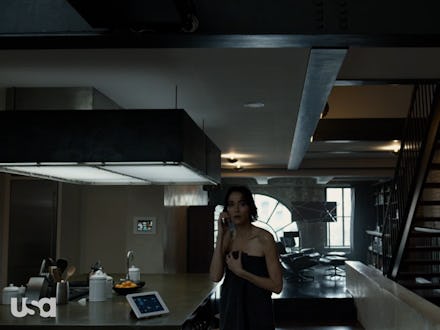'Mr. Robot' Season 2 Premiere Recap: Understanding the Terror of the Internet of Things

The season two premiere of Mr. Robot didn't do much to answer lingering questions from last season's finale — in fact, it skipped a month from when we last left Elliot and Co., and we still have no idea if Tyrell Wellick is alive. However, given that the series is constantly bucking the conventions of network television, going so far as to "leak" its own premiere half a week early, that same notion applies to its narrative.
(Editor's note: Spoilers ahead for the season premiere of Mr. Robot.)
Therefore, it's perhaps unsurprising that the highlight of the premiere had nothing to do with the main storyline. Rather, one scene would've stood out entirely on its own as a disturbing, strangely humorous short film. Here's why the Internet of Things sequence is more than just a fantastical take on technology use, but a dangerous precedent with real-world implications.
The scene follows a newly introduced member of Evil Corp, Susan Jacobs, who is the company's general counsel. She lives in what can be modestly described as a smart home — a house reliant on almost every facet on "smart technology," from the expected (her security system) to the mundane (her home theater and speakers).
However, Susan's over-reliance on this technology quickly turns on her, to a chilling degree. It starts small: her lights begin to flicker, the projector comes down on its own, music automatically plays. But the hack — perpetrated by members of fsociety — soon turns threatening.
While she's taking a shower, the heat is turned up to the point that she screams in pain and leaves the stall. The thermostat drops below 50 degrees. The alarm system cannot be turned off, and the speakers blast at the highest decibel level. She's powerless to stop it, and her only option is to leave the house immediately — though as a financially endowed member of Evil Corp, she's consigned to her secondary home in Greenwich, Connecticut. The horror!
It was enough to creep out some viewers, who expressed their distress on the Twitterverse.
In turn, fsociety get what they want: a temporary space to run operations after scaring her off. But the high-tech takeover acts as more than nuanced commentary on technology overuse — the increase in the Internet of Things and smart technology as a whole is a security threat.
Don't take our word for it, though. Instead, take the NSA's top hacking chief, Rob Joyce, who in January said smart home technology is one of his biggest concerns with regard to national security, as most smart devices don't heavily focus on security measures. "[Smart home] security is something that keeps me up at night," he said.
While the real-world hacks might not have the same dramatic effect as the fsociety takeover, they do in fact happen. This year, researchers at the University of Michigan were testing Samsung's smart home product line, and found vulnerabilities in the security system. They set off smoke alarms — and on camera, hacked a door lock.
The smart home sequence likely won't have any effect on the show's narrative; it's a one-off scene that was, above all else, a delight to watch unfold. Viewers looking for a straightforward answer to last season's chaotic finale might be disappointed, then, that Mr. Robot barely touched on these points — Elliot spends most of the episode going through a monotonous daily routine that includes journaling in a notebook as he tries to ignore the very loud and combative voice (Mr. Robot) in his head.
But if the premiere left you unsatisfied, Mr. Robot might not be for you. After all, the main point of view we get in the series is Elliot's, someone who suffers from dissociative disorder and massive hallucinations. We'll likely never get the full picture.
"Control is an illusion" is a mantra for season two the show has used in its marketing, and it's a phrase Elliot repeatedly writes down in his journal as Mr. Robot tries to take over his psyche. This applies to the audience as well. Instead of hoping for control — and answers — to the main problems, just enjoy the trippy ride. Nothing encapsulates this more than the premiere's most captivating sequence.
Read more: